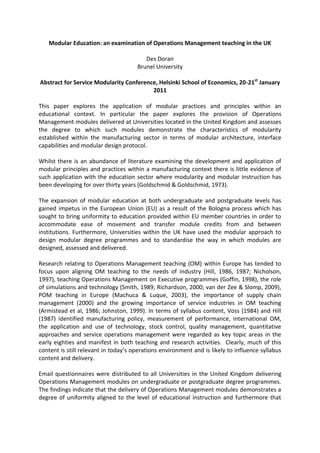
Modular Education: an examination of Operations Management teaching in the UK
- 1. Modular Education: an examination of Operations Management teaching in the UK Des Doran Brunel University Abstract for Service Modularity Conference, Helsinki School of Economics, 20-21st January 2011 This paper explores the application of modular practices and principles within an educational context. In particular the paper explores the provision of Operations Management modules delivered at Universities located in the United Kingdom and assesses the degree to which such modules demonstrate the characteristics of modularity established within the manufacturing sector in terms of modular architecture, interface capabilities and modular design protocol. Whilst there is an abundance of literature examining the development and application of modular principles and practices within a manufacturing context there is little evidence of such application with the education sector where modularity and modular instruction has been developing for over thirty years (Goldschmid & Goldschmid, 1973). The expansion of modular education at both undergraduate and postgraduate levels has gained impetus in the European Union (EU) as a result of the Bologna process which has sought to bring uniformity to education provided within EU member countries in order to accommodate ease of movement and transfer module credits from and between institutions. Furthermore, Universities within the UK have used the modular approach to design modular degree programmes and to standardise the way in which modules are designed, assessed and delivered. Research relating to Operations Management teaching (OM) within Europe has tended to focus upon aligning OM teaching to the needs of industry (Hill, 1986, 1987; Nicholson, 1997), teaching Operations Management on Executive programmes (Goffin, 1998), the role of simulations and technology (Smith, 1989; Richardson, 2000; van der Zee & Slomp, 2009), POM teaching in Europe (Machuca & Luque, 2003), the importance of supply chain management (2000) and the growing importance of service industries in OM teaching (Armistead et al, 1986; Johnston, 1999). In terms of syllabus content, Voss (1984) and Hill (1987) identified manufacturing policy, measurement of performance, international OM, the application and use of technology, stock control, quality management, quantitative approaches and service operations management were regarded as key topic areas in the early eighties and manifest in both teaching and research activities. Clearly, much of this content is still relevant in today’s operations environment and is likely to influence syllabus content and delivery. Email questionnaires were distributed to all Universities in the United Kingdom delivering Operations Management modules on undergraduate or postgraduate degree programmes. The findings indicate that the delivery of Operations Management modules demonstrates a degree of uniformity aligned to the level of educational instruction and furthermore that
- 2. such modules exhibit modular characteristics in terms of learning outcomes, credit values, topics studies, assessment strategies and indicative reading. 63 surveys were completed and returned during the period July to September 2010. Of this total, 19 per cent of respondents taught OM at undergraduate level only and 30 per cent taught at postgraduate level only; the remaining 51 per cent of respondents indicated that they taught on both undergraduate and postgraduate OM modules. To avoid questionnaire complexity, respondents were asked to complete the questionnaire by referring to undergraduate or postgraduate only. 42 per cent of respondents chose to address the delivery of undergraduate modules and the remaining 58 per cent of respondents elected to focus on the delivery of OM on postgraduate modules delivered on MBA and MSc programmes. The findings indicate that close to 90% of respondents were involved in the design of modules and that they had changed key elements of the module. The most popular changes to modules included changes to module content (84%), assessment diet (71%), indicative reading (68%), learning outcomes (46%) and module aims (41%). Such changes were stimulated primarily by a need to reflect changes occurring in the field of Operations Management (76%) and feedback from students (61%). The median value for credit value associated with the module was 15 credits (43%) whilst the median value for the number of module aims was between 1 and 3 (57%). The number of learning outcomes associated with the module was generally between 4 and 5 (59%). In terms of module content there was some degree of alignment between postgraduate and undergraduate programmes (Table I) although there were a number of deviations (Fig I)
- 3. Table I – Module content Content area Postgraduate Undergraduate All Ranking (All) The role of Operations 97% (1) 88% (3) 93% 1 Management Operations Strategy 91% (3) 84% (5) 88% 3 Process design 81% (6) 96% (1) 88% 3 Job design and work 47% (9) 56% (8) 51% 7 organisation Capacity management 88% (4) 80% (6) 84% 4 and control Inventory 84% (5) 68% (7) 77% 5 management Lean operations and 94 % (2) 92% (2) 93% 1 JIT Supply Chain 94 % (2) 88% (4) 91% 2 Management Project planning and 53% (8) 48% (9) 51% 7 management Business process 60 % (7) 84% (5) 70% 6 improvement techniques and tools Global Operations 44% (10) 24% (10) 35% 8 Management Ranking of content areas shown in parentheses
- 4. Figure I – Use of Content areas
